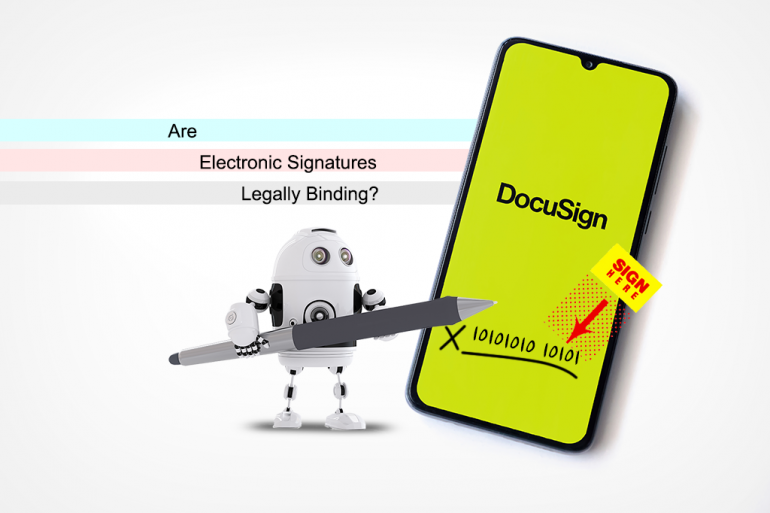Are Electronic Signatures Legally Binding?
Clients sometimes ask whether DocuSign and similar apps are safe to use. The convenience just seems too good to be true.
E-signing technology is becoming more common, and the benefits are undeniable. With these apps, you can affix your signature with a simple tap on your phone screen. Compare that with having to print the document, sign, scan, and then email the signed copy. Sometimes you have to go find witnesses. If notarization is required, then you really have yourself a project.
So, naturally, we would all prefer to e-sign documents. However, no amount of convenience is worthwhile if the signatures are not enforceable.
Legal Analysis: Are E-Signatures as Valid as Handwritten Signatures?
The legal analysis here is very straightforward. The ESIGN Act has been in place at the federal level for over 20 years. The same is true for the Uniform Electronic Transactions Act (UETA), which is state-level legislation adopted by all but two states (Illinois and New York). To summarize, both acts say that a record or signature may not be denied legal effect or enforceability solely because it is in electronic form.
From a legal perspective, an e-signature has exactly the same validity as the handwritten version.
Practical Application
Here, the analysis gets a bit more interesting. Keep in mind that the objective behind the whole signature ritual is to bind people to the rights and obligations in their agreements. So, in the end, what we really want is enforceability.
Is it easier for someone to weasel out of an electronically signed contract? The answer turns on the person’s ability to say, “Hey, that’s not my signature.”
When deciding whether to enforce an agreement, a judge wants to know if the parties intended to be bound by the agreement. So, if the person on the other side is willing to lie about signing, and you have to prove the signature on the contract is authentic, what can you do?
In the past, having witnesses and/or notarization has been a solid way of proving someone voluntarily signed a document. This kind of acknowledgment is still good evidence nowadays, but it is not as undeniable as it once was.
With a variety of software commonly available today, it is not too hard to take a picture of someone’s actual signature and manipulate it onto another document.
A person willing to commit fraud could use PDF or JPEG software to fake the signatures of both the party to the agreement and the witnesses. Notarization is equally vulnerable. With a picture of a notary stamp and some old-fashioned forgery, a fraudster could rather easily put together a document that appears to have been signed, witnessed, and notarized.
The traditional methods are good, but they are not ironclad. In reality, they never have been (cue Catch Me If You Can). With just a little ingenuity, any document can be faked.
The person you are trying to hold to a contract could say, “That looks like my signature, but I didn’t sign that document.”
Digital Signatures Are the Way of the Future
Since there is no way to ever be 100% certain that a signature is authentic — even with witnesses and notarization — why not take advantage of the convenience of e-signing? That logic is sound. Even beyond that, though, e-signatures can be more secure than handwritten signatures.
For one thing, e-signature apps generate a Certificate of Authenticity showing when and where the digital signature was affixed. Of course, that simple certificate is not proof positive, but it may very well be as good as notarization.
At this point you may be thinking, These e-sign apps depend entirely upon email addresses, so it would be very easy for someone to get out of a contract by just saying “Someone hacked my email” or “Other people have access to the email account, and I didn’t authorize the signature.”
Now we come to the crux. Don’t you normally have an email thread showing discussions leading up to execution of the document? Or maybe text messages?
Even if you only send a single confirmation email saying something like “I received your e-signed document,” any judge would find that to be very compelling evidence…assuming the other side did not respond with something like “What are you talking about? I didn’t sign anything.”
When you boil down to the actual purpose of a signature (demonstrating a person willingly entered into an agreement), e-signing apps are not only incredibly convenient and environment-friendly, but they also provide the ability — through written communications before and/or after signing — to authenticate signatures more effectively than any of the traditional methods.
There are still some agencies that have not caught up with digital signing. For example, we still have to submit immigration documents, loan documents, and certain others with wet ink originals. Nonetheless, electronic signing is definitely the way of the future, and we will all be better off for it.








